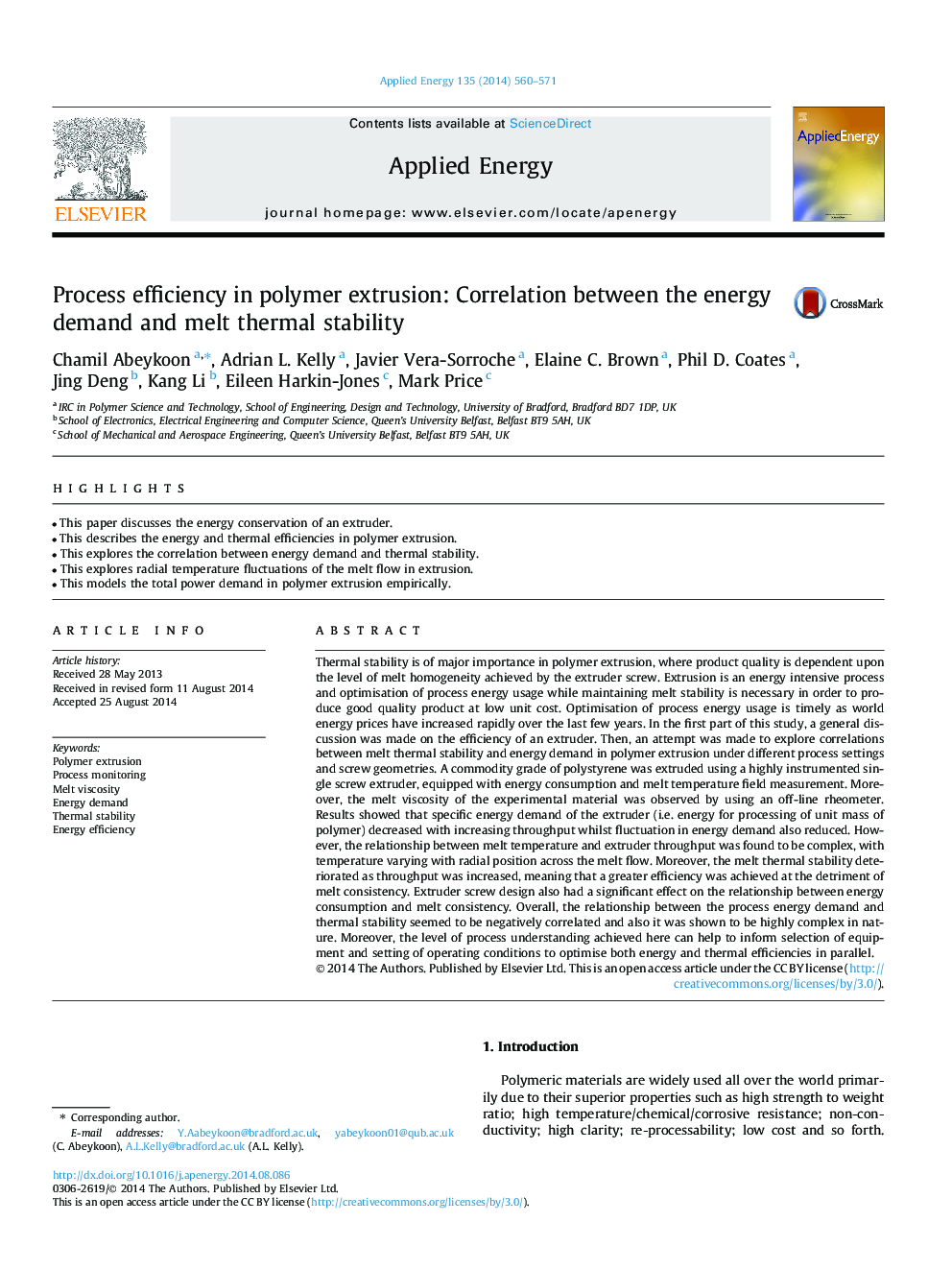| کد مقاله | کد نشریه | سال انتشار | مقاله انگلیسی | نسخه تمام متن |
|---|---|---|---|---|
| 6689277 | 501889 | 2014 | 12 صفحه PDF | دانلود رایگان |
عنوان انگلیسی مقاله ISI
Process efficiency in polymer extrusion: Correlation between the energy demand and melt thermal stability
ترجمه فارسی عنوان
کارایی فرایند در اکسترودر پلیمر: همبستگی بین تقاضای انرژی و پایداری حرارتی ذوب
دانلود مقاله + سفارش ترجمه
دانلود مقاله ISI انگلیسی
رایگان برای ایرانیان
کلمات کلیدی
اکستروژن پلیمر، نظارت بر فرآیند، ویسکوزیته ذوب، تقاضای انرژی، پایداری حرارتی، بهره وری انرژی،
ترجمه چکیده
پایداری حرارتی در اکستروژن پلیمر مهم است، در حالیکه کیفیت محصول بستگی به سطح همگنی ذوب حاصل از پیچ اکسترودر دارد. اکستروژن یک فرآیند فشرده سازی انرژی و بهینه سازی مصرف انرژی در فرآیند است، در حالی که حفظ ثبات ذوب به منظور تولید محصول با کیفیت با هزینه پایین واحد ضروری است. بهینه سازی مصرف انرژی در فرآیند به موقع است زیرا قیمت انرژی در جهان طی چند سال اخیر به سرعت افزایش یافته است. در بخش اول این مطالعه، یک بحث کلی درباره کارایی یک اکسترودر ساخته شد. سپس تلاش برای بررسی رابطه بین ثبات حرارتی ذوب و تقاضای انرژی در اکستروژن پلیمر تحت تنظیمات فرایند مختلف و هندسه پیچ انجام شد. یک درجه کالای پلی استایرن با استفاده از یک اکسترودر تک تک پیچ پیچیده، با مصرف انرژی و اندازه گیری درجه حرارت ذوب، اکسترود شد. علاوه بر این، ویسکوزیته ذوب مواد آزمایشی با استفاده از یک ریمومتر خنثی مشاهده شد. نتایج نشان داد که تقاضای انرژی خاص اکسترودر (یعنی انرژی برای پردازش جرم واحد پلیمری) با افزایش کارایی کاهش می یابد در حالیکه نوسان در تقاضای انرژی نیز کاهش می یابد. با این حال، رابطه بین دمای ذوب و میزان نفوذ اکسترودر پیچیده است، با درجه حرارت متفاوت با موقعیت شعاعی در سراسر جریان ذوب. علاوه بر این، ثبات حرارتی ذوب، به علت افزایش بهره وری، بدتر شد، به این معنی که بهره وری بیشتر در معرض خطر انقباض ذوب قرار گرفت. طراحی اکسترودر پیچ نیز تاثیر قابل توجهی بر رابطه بین مصرف انرژی و قوام ذوب داشت. به طور کلی، رابطه بین تقاضای انرژی فرآیند و ثبات حرارتی به نظر می رسد که منفی همبستگی دارد و همچنین نشان داده شد که در طبیعت بسیار پیچیده است. علاوه بر این، سطح شناخت فرآیند در اینجا به دست می آید که بتواند انتخاب تجهیزات و تنظیم شرایط عملیاتی را برای بهینه سازی هر چه بیشتر انرژی و عملکرد حرارتی به موازات کمک کند.
موضوعات مرتبط
مهندسی و علوم پایه
مهندسی انرژی
مهندسی انرژی و فناوری های برق
چکیده انگلیسی
Thermal stability is of major importance in polymer extrusion, where product quality is dependent upon the level of melt homogeneity achieved by the extruder screw. Extrusion is an energy intensive process and optimisation of process energy usage while maintaining melt stability is necessary in order to produce good quality product at low unit cost. Optimisation of process energy usage is timely as world energy prices have increased rapidly over the last few years. In the first part of this study, a general discussion was made on the efficiency of an extruder. Then, an attempt was made to explore correlations between melt thermal stability and energy demand in polymer extrusion under different process settings and screw geometries. A commodity grade of polystyrene was extruded using a highly instrumented single screw extruder, equipped with energy consumption and melt temperature field measurement. Moreover, the melt viscosity of the experimental material was observed by using an off-line rheometer. Results showed that specific energy demand of the extruder (i.e. energy for processing of unit mass of polymer) decreased with increasing throughput whilst fluctuation in energy demand also reduced. However, the relationship between melt temperature and extruder throughput was found to be complex, with temperature varying with radial position across the melt flow. Moreover, the melt thermal stability deteriorated as throughput was increased, meaning that a greater efficiency was achieved at the detriment of melt consistency. Extruder screw design also had a significant effect on the relationship between energy consumption and melt consistency. Overall, the relationship between the process energy demand and thermal stability seemed to be negatively correlated and also it was shown to be highly complex in nature. Moreover, the level of process understanding achieved here can help to inform selection of equipment and setting of operating conditions to optimise both energy and thermal efficiencies in parallel.
ناشر
Database: Elsevier - ScienceDirect (ساینس دایرکت)
Journal: Applied Energy - Volume 135, 15 December 2014, Pages 560-571
Journal: Applied Energy - Volume 135, 15 December 2014, Pages 560-571
نویسندگان
Chamil Abeykoon, Adrian L. Kelly, Javier Vera-Sorroche, Elaine C. Brown, Phil D. Coates, Jing Deng, Kang Li, Eileen Harkin-Jones, Mark Price,
